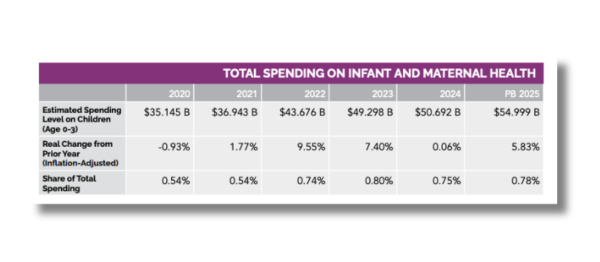Provide $90 billion for a State Fiscal Stabilization Fund for grants to states to support statewide and local funding for K-12 education. Funds could be used to support:
- Activities authorized under the Elementary and Secondary Education Act (ESEA), Individuals with Disabilities Education Act (IDEA), and McKinney-Vento Homeless Assistance Act.
- Covering costs associated with making up instructional time.
- Providing school-based supports for impacted students, including counseling, mental health services, family engagement efforts, and coordination of physical health services.
- Cleaning and sanitation of schools and school transportation.
- Professional development for school-based staff on trauma-informed care.
- Coordination efforts between State Education Agencies (SEAs) and public health departments.
- $1.7 billion for Historically Black Colleges and Universities (HBCUs) and Minority Serving Institutions.
- $20 million for Howard University.
- $11 million for Gallaudet University.
- $11 million for the National Technical Institute for the Deaf.
- $8.4 billion for other higher education institutions.
- The bill would also authorize $5 billion for the Federal Communications Commission’s (FCC) E-Rate program for schools and libraries to provide internet services to students and teachers.
- The study would examine new and existing programs, partnerships, and organizations relating to food security, education, economic opportunity, and disaster or emergency response that could be utilized to respond to the crisis.
Health
- Increase Federal Medical Assistance Percentage (FMAP) payments to state Medicaid programs by a total of 14 percentage points starting July 1, 2020 through June 30, 2021.
- Prevent the Secretary of Health and Human Services (HHS) from finalizing the Medicaid Fiscal Accountability Regulation (MFAR) until the end of the COVID-19 public health emergency.
- Increase federal payments to state Medicaid programs by an additional 10 percentage points starting July 1, 2020 through June 30, 2021 to support activities that strengthen their home- and community-based services (HCBS) benefit.
- Eliminate cost sharing for Medicaid beneficiaries for COVID-19 treatment and vaccines during the COVID-19 public health emergency.
- Ensure that uninsured individuals who opt to cover through the new Medicaid eligibility pathway will be able to receive treatment for COVID-19 without cost sharing during the COVID-19 public health emergency.
- Clarify that services received through urban Indian providers are matched at 100 percent FMAP through June 30, 2021.
- Clarify that for immigrants who are ineligible for full-scope Medicaid due to immigration status–but who meet other Medicaid eligibility requirements–coverage for COVID-19 testing, treatment and vaccines is available through Emergency Medicaid.
- Codify the regulatory requirement that state Medicaid programs cover non-emergency medical transportation (NEMT).
- Provide full premium subsidies for COBRA benefits.
- Adds $2.1 billion for the Indian Health Service to address health care needs related to the coronavirus of Native Americans.
- Provide $7.6 billion for health centers through the Health Resources and Services Administration to support expanded health care services for underserved populations.
- Increase by $3 billion funding for mental health support and substance use treatment, including $100 million for Project AWARE to reach students.
- Provide $10 million for National Child Traumatic Stress Network.
- Amend the Pediatric Vaccines program to cover, at no cost, a COVID-19 vaccine for all children receiving vaccinations through this program.
- Provides one state an exemption from preserving the Maintenance of Effort for Medicaid from the Families First Act that requires states to continue Medicaid eligibility and benefits.
Housing and Homelessness
- Institute an eviction moratorium for a year for all renters, with the exception of those living in hotels and motels, and a required 30-day notice to vacate after that.
- Provide $100 billion for an Emergency Rental Assistance Program to help renters cover their rent and utility bills.
- Increase the Section 8 Housing Choice Voucher program by $3.5 billion and add $5 billion for the public housing operating fund.
- Provide $1 billion for additional Section 8 Housing Choice vouchers for people at-risk of homelessness and survivors of domestic violence.
- Increase funding for the Legal Services Corporation by $50 million to address the increased civil legal service needs of households due to the pandemic, including housing-related issues.
- Adds $1.5 billion for the Low Income Home Energy Assistance Program (LIHEAP).
- Provide $1.5 billion to cover water bills for low-income families.
- Provide $75 billion to states, territories, and tribes to help homeowners with mortgage payments, property taxes, insurance, utilities, and other housing costs.
Hunger and Nutrition
- Increase the maximum Supplemental Nutrition Assistance Program (SNAP) benefit level by 15 percent through September 2021, which benefits the lowest income households who were previously at the maximum amount.
- Provide $10 billion for SNAP to cover increased program participation and costs.
- Increase the minimum SNAP benefit from $16 per month to $30 per month.
- Extend the Pandemic Electronic Benefits Transfer (P-EBT) program through the summer and until schools reopen. P-EBT would also now include children who would be receiving meals through child care. P-EBT assistance is available to households with children regardless of immigration status.
- Mandate the U.S. Department of Agriculture (USDA) to conduct a feasibility study on implementation of P-EBT in Puerto Rico, Northern Mariana Islands, and American Samoa, but would not extend the program to these territories.
- Waive all work requirements for SNAP and prevent USDA from implementing or finalizing the Able-Bodied Adults Without Dependents, Broad Based Categorical Eligibility, and Standard Utility Allowance rules.
- Direct USDA to allow the use of SNAP to purchase hot foods or hot food products ready for immediate consumption from authorized retail food stores.
- Adds $1.1 billion for the Special Supplemental Nutrition Assistance Program for Women, Infants and Children (WIC) through September 2020.
- Increase the WIC Cash Value Voucher from $9 for children and $11 for women per month to $35 per month for both women and children through the end of 2020.
- Provide $3 billion in relief for school child nutrition programs that are facing increased costs and losing revenue, and specifies that reimbursements for school meals for the school year 2019-2020 may not be less than the amounts provided for the school year 2018-2019.
- Direct USDA to authorize all child nutrition waivers in a timely and public manner.
- Provide $150 million for the Emergency Food Assistance Program, which provides funding for food banks and other local organizations.
- Continue USDA’s waiver authority for the Fresh Fruit and Vegetable Program to allow schools more flexibility in serving fresh fruits and vegetables.
- Increase monthly SNAP benefits for families in Puerto Rico through September 2021 to make them more equitable.
Income Supports
Additional Recovery Payments to Individuals
- Authorize one additional round of economic impact payments of $1,200 for a single taxpayer and $2,400 for those filing jointly, and make those payments equal for adults and children — an improvement over the current “recovery rebate” program that provides $1,200 to qualifying adults but merely $500 for each qualifying child. The payments are subject to the same income requirements as the previous payments and based on 2018 or 2019 tax return information.
- Limit qualifications for payments to a maximum of three dependents.
- Fix some of the shortcomings in the current “economic rebate” program to ensure that college students, non-child dependents, and Individual Taxpayer Identification Number (ITIN) filers are eligible. These improvements are retroactive to the first round of “recovery rebates.”
- Instruct the Treasury Department to issue advance payments to Social Security beneficiaries, Supplemental Security Income recipients, Railroad Retirement Board beneficiaries, and Veterans Administration beneficiaries who did not file returns for 2018 or 2019 based on information provided by the Social Security Administration, the Railroad Retirement Board, and the Veterans Administration, respectively. In addition, the department shall conduct outreach to non-filers to inform them of how to file for their advance payment.
- Protect an individual’s rebate that exceeds the maximum allowable credit based on 2020 information, and the individual would not be required to repay any amount of the rebate to the Treasury. If the allowable credit, based on 2020 information, exceeds the amount of the advance payment, taxpayers can claim the difference on their 2020 tax returns.
- Instruct the Treasury Department to make payments to the territories.
- Exempts the rebate payments from reduction or offset regarding past due child support.
- Would not authorize recurring payments that would be linked to an economic indicator so that the payments are recurring cash benefits that continue throughout the economic recovery.
Child Tax Credit (CTC) Temporary Expansion
- Make the CTC fully refundable for 2020, increase the amount of the credit to $3,000 per child per year (up from $2,000) for older eligible children, and authorize $3,600 per child per year for children under age six.
- Add 17-year-olds as qualifying children for the credit.
- Require the Treasury Secretary to make the best efforts to provide the enhanced credits in the form of an advanced payment.
- Benefit the US territories. Puerto Rico residents now would file directly with the IRS.
Child and Dependent Care Tax Credit (CDCTC) Temporary Expansion
- Make the CDCTC fully refundable in 2020.
- Increase the maximum credit rate to 50% from 35%.
- Raise the phaseout threshold significantly from $15,000 to $120,000, and double the amount of expenses eligible for the credit from $3,000 to $6,000 for one qualifying individual and $12,000 for two or more qualifying individuals.
Earned Income Tax Credit (EITC) Temporary Expansion
- Reduce the minimum age to claim the childless EITC from 25 to 19 (except for full-time students) to benefit young adults and foster youth and raise the maximum age from 65 to 66.
- Increase the phase-in rate of the credit and raise the earned income amount to $9,720 and phase out starting at $11,490 for a maximum credit of $1,487 (instead of $538).
- Repeal the provision that denied the childless benefit to those individuals with children who did not meet SSN requirements. Now these parents qualify for the childless EITC.
- Instruct the Treasury Department to make payments to the territories.
- Allow a married taxpayer who is filing separately to be treated as not married for EITC eligibility (with limits).
- Can base earned income on 2019 income if 2020 earned income is less than 2019.
- Would not expand the credit for households with children.
Temporary Assistance for Needy Families Program
- Suspend the federal work participation rate requirements and federal time limits for the Temporary Assistance for Needy Families (TANF) program through January 31, 2021, and institute penalties for any State or Tribal programs that fail to suspend these requirements and time limits.
Juvenile Justice
- Provide $75 million for Juvenile Specific Services.
- Require judges to release juveniles to their parents upon their promise to return the juvenile to court when requested by the judicial officer.
- Modify probation and supervised release policies to avoid unnecessary in-person contact with probation officers and to reduce the numbers of those supervised and those imprisoned for violations.
- Incentivize states to stop using fines and fees.
Work Supports
Paid Sick Days and Paid Leave
Many improvements were made to provisions in the Families First Coronavirus Response Act in regards to paid sick days and paid leave that would expand access and increase available benefits. These improvements would include, but are not limited to:
- Eliminate the 500+ employee exemption (but these larger companies would not qualify for tax credits).
- Eliminate the small business self-exemption.
- Expand the caregiving and medical reasons for taking paid leave, including a public order for self-isolation, seeking a diagnosis, and caring for family members.
- Eliminate exemptions for health care workers and emergency responders.
- Extend paid leave from 10 weeks to 12 weeks.
- Extend the sunset date from December 31, 2020 to December 31, 2021.
- Clarify to ensure that this leave due to COVID-19 does not count against regular Family and Medical Leave Act (FMLA) leave.
- Clarify that non-profit workers are eligible.
- Increase wage replacement to ensure that benefit amounts do not fall below the minimum wage.
Unemployment Insurance (UI) Benefits
- Extend the $600 weekly benefit provided through the Federal Pandemic Unemployment Compensation program through January 31, 2021 and disregard these payments for purposes of federal or state program eligibility.
- Extend Pandemic Unemployment Assistance benefits, for workers who don’t normally qualify for UI, through January 31, 2021.
- Extend the Extended Pandemic Unemployment Compensation, which provides an additional 13 weeks of benefits who have exhausted other benefits, through January 31, 2021.
- Excludes Pandemic Unemployment Compensation as income toward SNAP eligibility and benefit levels.
- Provide $925 million for States to process UI claims and $15 million for federal UI administration.
You may also like

Aug 05, 2024 Early Childhood
Babies in The Budget 2024: Infant and Maternal Health and Well-Being
First Focus on Children takes a broad view of infant and maternal health and well-being in this fact sheet.
Partner Content

Aug 02, 2024 Child Rights
Fact Sheet: The Child Safety and Well-Being Act of 2024
For too long, children and marginalized youth have been “invisible” and often left out of conversations when public policy.

May 30, 2024 Child Nutrition
Fact Sheet: The Farm Bill Is a Children’s Health Bill (Updated)
One-in-10 children in America are without enough food to eat, which can lead to poor academic performance, behavioral health.

Mar 13, 2024 Children's Health
Fact Sheet: Congress Should Prioritize Development of the Pediatric Mental Health Workforce
Our Children are in Crisis The United States has a severe shortage of pediatric mental health professionals. In fact.

First Focus is a bipartisan advocacy organization dedicated to making children and families the priority in federal policy and budget decisions.
1400 Eye Street NW
Suite 450
Washington, DC 20005










